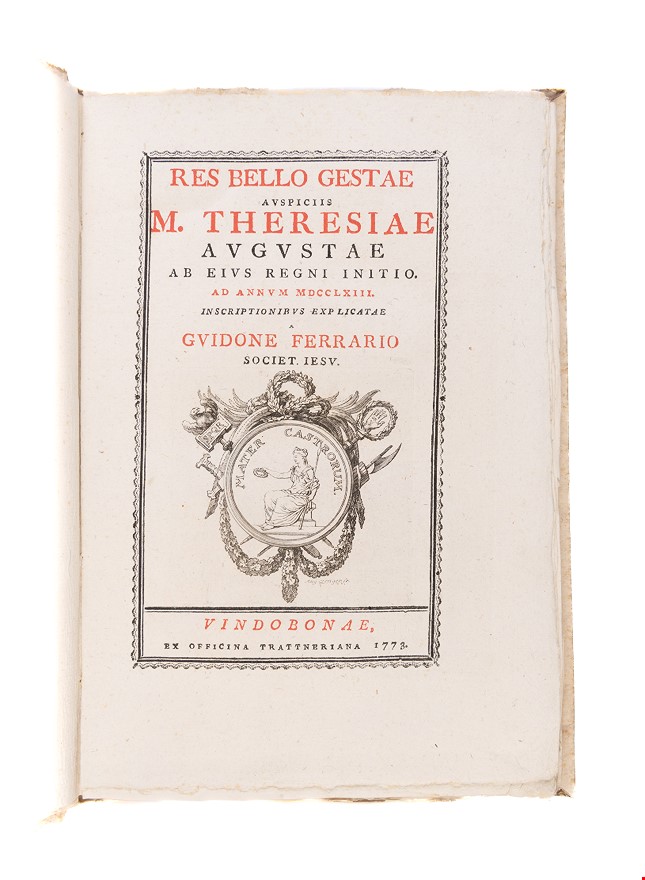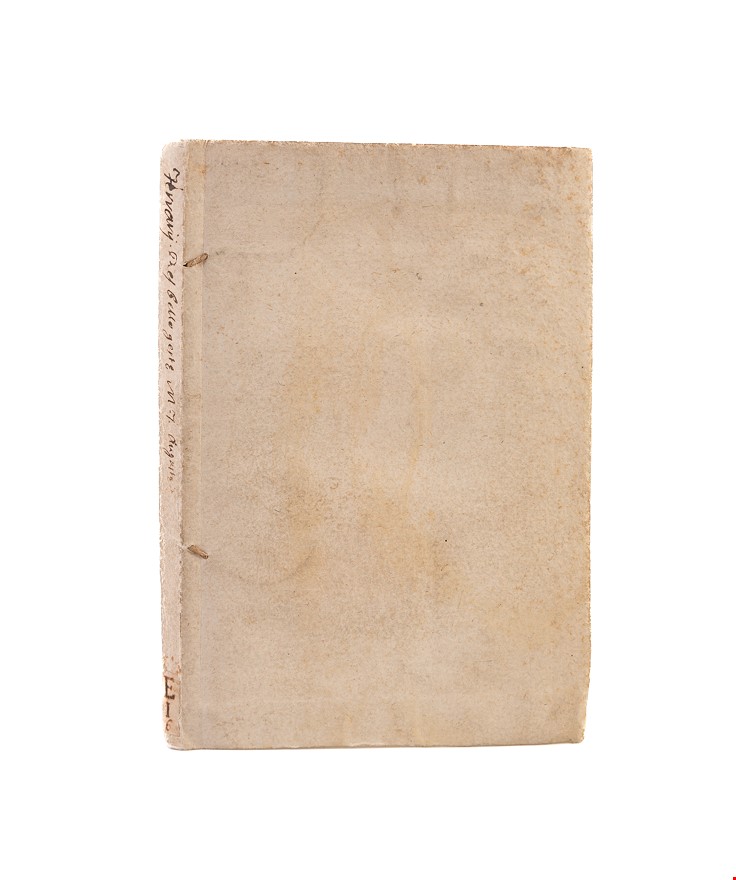Res bello gestae auspiciis M. Theresiae Augustae ab eius regni initio, ad annum MDCCLXIII. Inscriptionibus explicatae. Vienna, ex officina Trattneriana,
FERRARIO Guido (1773.)
£450.00
Please contact us in advance if you would like to view this book at our Curzon Street shop.
Title printed in red and black within a typographical border, and with a large engraved vignette, each page within a two-line frame. 4to. [4]ff. 104pp. Original cartonnage binding, uncut.
A rare work in praise of Empress Maria Theresa, this pristine copy in the original binding celebrates her military achievements in the form of 124 inscriptions, all printed in capitals, presented by the author to one of the Empress’ noblemen
A tradition started by Augustus with his Res Gestae Divi Augusti, as a means of writing his own legacy, this practice is taken up for the much later Empress Maria Theresa (dates) here in this volume, which specifically addresses and lauds her deeds in war.
Published in the last decade of her life, just as the American Revolution was getting started and ten years after the Seven Years War, this book recounts Maria Theresa’s own deeds in warfare, ending with an inscription about how she has fought so that now the people can enjoy peace. Guido Ferrarius (1717-1791), its author, was an Italian Jesuit who served as a historian, teacher, and writer. He wrote a similarly elegiac work about Prince Eugene of Savoy, and notes in the front matter to the present work that it was put together during a period of ill health that caused him to revisit inscriptions he had made previously for his students.
Maria Theresa, born to a father with no sons, was little prepared for succeeding her father, Holy Roman Emperor Charles VI, who, despite bending over backwards to secure her inheritance, did not prepare her for the practicalities of governance. Having received the minimal education thought to befit a woman, Maria Theresa ascended the Austrian throne after her father’s death to inherit great discord, along with insufficient preparation, money, military, and advisers. Her father’s death sparked the War of Austrian Succession, and, eventually, the Seven Years War; yet it proved an opportunity for Maria Theresa to establish her empire as a significant power, and herself as a respected leader.
While much of her early reign was marked by war, and it is the focus of the present work, her long (40 year) tenure was also characterised by domestic reforms in education, literacy, vaccination, and taking steps towards the abolition of serfdom. She ultimately transformed Austria into a more modern and more rational, stable power as the era of Enlightenment began.
The work is dedicated to Joseph Von Sperges (1725-1791), an administrator and diplomat in Milan who advised the Empress and who worked with Kaunitz, one of her key advisers, and who Ferrarius praises for his humanitas. With an engraving by Augustin Zenger, an 18th century Viennese engraver who worked generally for booksellers, this was published by Johann Thomas von Trattner (1717-1798), a much-hated bookseller whose privilege as book printer for the Austrian court allowed him to become a notorious reprinter, causing financial losses to both the authors he botched and ripped-off and other printers. Provenance: With an additional leaf of paper, loose, with a manuscript presentation inscription from the author to Renato Borromeo, with an unknown watermark likely including the word ‘Bergamo’ (near Milan) and a tulip-like floral design. This Borromeo is likely Renato Borromeo III (1710-1778), a Milanese nobleman who was on very good terms with Maria Theresa, even asking her to exile his own mother for her staunchly pro-Spanish sentiments at the time when Milan became a part of the Austrian kingdom.
This book is very rare, with apparently only one edition, and no copies held in libraries in the UK or US according to OCLC.
Stock Code: 37270





